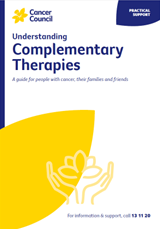- Home
- About Cancer
- Living well
- Complementary therapies
- Individual therapies
- Spiritual practices
Spiritual practices
What are they?
Spirituality is a very individual concept. For some, it may mean being part of an organised religion such as Christianity, Judaism, Islam or Buddhism. For others, spirituality may reflect their own individual beliefs about the universe and their place in it, or a search for meaning and purpose in their lives.
Why use them
Often when people are diagnosed with cancer, the spiritual aspect of their lives becomes more important. People may find comfort in prayer, meditation or quiet contemplation.
Receiving care from a spiritual care practitioner, who may also be called a pastoral carer, chaplain or priest, can often help people, even if they are not part of an organised religion.
What to expect
If you are part of a spiritual or religious community, you may benefit from:
- prayer or meditation groups
- a feeling of unity and connection from the congregation
- practical, emotional and spiritual support offered by members of your spiritual or religious community.
If you are not part of a formal community, you can find out more about your area of spiritual interest from a spiritual care practitioner, support groups, friendship groups, your local library or online. A spiritual care practitioner is often a member of the team at hospitals and cancer treatment centres.
What is the evidence?
There is growing scientific evidence of a positive link between spiritual practices and health. They have been shown to reduce stress, instil peace and improve ability to manage challenges.
Meditation and Relaxation Podcast
Listen to more of our meditation and relaxation podcast for people affected by cancer
More resources
Dr David Joske, Clinical Haematologist, Sir Charles Gairdner Hospital and PathWest, Chairman and Founder Solaris Cancer Care Foundation, Clinical Professor of Medicine, The University of Western Australia, WA; Australasian Integrative Medicine Association (AIMA); Dr Robert Blum, Clinical Director, Cancer Services, Bendigo Health, NSW; Sally Brooks, Senior Pharmacist, Medicines Information, Peter MacCallum Cancer Centre, VIC; Dr Suzanne Grant, Senior Research Fellow, NICM Health Research Institute, Western Sydney University, and Chris O’Brien Lifehouse, NSW; Prof Danforn Lim, Adjunct Professor and Advisory Board Member, NICM Health Research Institute, Western Sydney University, and Adjunct Professor, UTS, NSW; Christina Line, Statewide Services Senior Coordinator, Cancer Council WA; Jen McKenzie, Physiotherapist (Lymphoedema) and ESSA Accredited Exercise Physiologist, The McKenzie Clinic, QLD; Simone Noelker, Wellness Centre and Pastoral Care Manager, Ballarat Regional Integrated Cancer Centre, VIC; Dr Nirzari Pandit, General Practitioner, RACGP Specific Interests Integrative Medicine Group, NSW; Georgie Pearson, Consumer; Cris Pirone, Counsellor, Cancer Council SA; Dr Elysia Thornton-Benko, Specialist General Practitioner, and UNSW Research Fellow, NSW; Kirsty Trebilcock, 13 11 20 Consultant, Cancer Council SA.
View the Cancer Council NSW editorial policy.
View all publications or call 13 11 20 for free printed copies.
Need to talk?
Support services
Coping with cancer?
Speak to a health professional or to someone who has been there, or find a support group or forum
Looking for transport, accommodation or home help?
Practical advice and support during and after treatment
Cancer information
Dealing with the diagnosis
Common reactions to a cancer diagnosis and how to find hope
Explore our resource hub
Explore and download our booklets, fact sheets, podcasts, webinars and videos for people affected by cancer

